Mortgage forbearance temporarily eliminated your mortgage payment obligation, which may have saved you from foreclosure, but you are now back on your feet and facing repayment options. One of those options, offered by both Fannie Mae
FNMA
With the COVID-19 Payment Deferral, you essentially return to making your regular mortgage payments, and the maturity date, remaining term, interest rate and payment schedule will remain unchanged once you do so. The deferred payments will be due at the end of the loan, such as when your loan is paid off, refinanced or your home is sold.
This option was described to me by a borrower planning to exit forbearance as an “interest-free loan” which, if the claims for it are accurate, is the obvious choice. I checked out her loan with a spreadsheet and found that the claims made by Freddie Mac that “maturity date, remaining term, interest rate and payment schedule will remain unchanged” were correct. With this option, everything ends up the same as it would have had there been no forbearance and the loan went to term, except that at the end, the missed payments have to be repaid.
What is missing in the explanations of both Fannie Mae and Freddie Mac is an indication of how much better off borrowers in forbearance would be if they paid off the arrears at the outset rather than at the end. In the case I examined, the borrower owed $8,308 for the 13 months of payments she missed. If she paid that now, her loan would be paid off in 314 months and the cumulated interest payments would be $74,643. If instead she opted for payment deferral, she would pay off in 352 months, her cumulated interest would be $90,662, and she would still owe the $8,308 of arrears. Repayment plans involving additional monthly payments would fall between these polar cases.
The moral: don’t be dazzled by the prospect of an interest-free loan. The sooner you pay it, the better off you will be.
